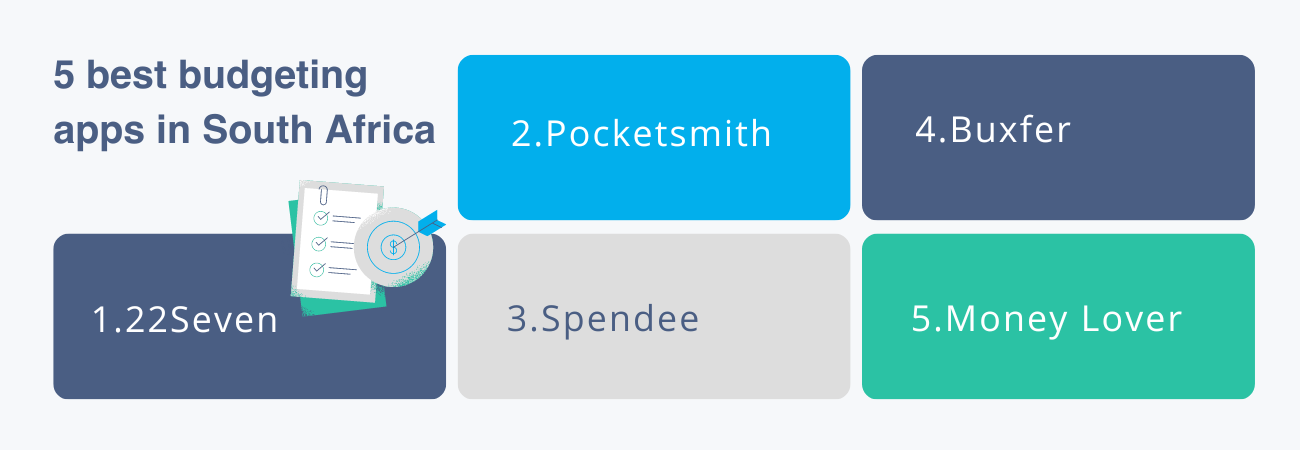Whether you got a bit carried away with spending over the holidays or you just want to learn how to save more money – either way, we are pretty sure you’ll be looking for the best ways to budget and track your expenses. Budgeting for South Africans is not something that comes very easily, especially with the rise in living costs coupled with a lack of financial education. We’ve rounded up the top 5 budgeting apps available in South Africa right now, but before we do that let’s have a look at some financial jargon and a couple of budgeting and savings tips to follow.

What is budgeting?
South African youth can find budgeting quite hard, especially if they haven’t grown up in a household where this is the norm. So what is it exactly, and how can South Africans budget better? Budgeting is the process of creating a financial plan to manage your money and expenses. A budget allows you to track your income and expenses and make sure that you are saving enough money and not spending more than you earn. It also helps you prioritise your spending and make sure that you are allocating your money towards the things that are most important to you.
What are five things to consider when drawing up a budget?
When drawing up a plan, there are five key elements of your budget:
1. Income
You should have a clear understanding of how much money you bring in and earn on a regular basis. Your income can include anything from your salary, bonuses, gained interest on investments or even money you earn from your side hustle. It is important to have an accurate picture of your income to set a realistic budget and be able to plan for the future.
2. Expenses
Make a comprehensive list of all your expenses, both fixed and variable. Fixed expenses (much like the name are fixed items that cannot be removed or changed) are items like your rent or home loan payments. Your variable expenses include things like groceries and entertainment, they are items that may change from month to moth and most likely are items you will most likely be able to cut out. Be sure to include all of your regular expenses, as well as any irregular expenses that you know are coming up.
3. Savings goals
Consider your short-term and long-term financial goals and set specific, measurable goals for saving money each month. It’s important to have a concrete idea of how much you want to save, and how you want to use the money so that you can budget accordingly. Break these goals up into bite-sized goals so that it isn’t too daunting.
4. Financial priorities
Consider what is most important to you when it comes to financial priorities and make sure that your budget reflects those priorities. This can include things like saving for retirement, a wedding or a holiday or paying off debt, or building an emergency fund.
5. Financial flexibility
Life is unpredictable and things might change, therefore be prepared to adapt your budget as needed. For example, you might change companies and have a temporary salary cut, or there might be unexpected expenses that come up. Keeping your budget flexible, means you may need to make adjustments to your budget to account for these sudden changes. Ensuring that flexibility is part of your budgeting plan will help you stay on track and make sure that you’re still able to meet your financial goals.
What are the 5 steps to good budgeting?
If you’ve typed into google like most of us, what’s the best finance planner in South Africa, then chances are you’ll need a little help with what steps to take with budgeting. We’ve put together a step-by-step guide on how to budget better, here are the 5 essential steps for good budgeting:
1. Gather all your financial information
Information gathering will always be the first step in good budgeting. Find a place to store all this information, and ensure you save it to the cloud. Financial information will include things like: income, expenses, and bills. You should also review your bank statements and credit card statements to get a complete picture of your spending habits.
2. Categorize your expenses
Now that you have your financial information in an excel spreadsheet, the next step is to divide your expenses into categories, such as housing, transportation, food, and entertainment. We’d suggest using a colouring system to organise these expenses. This will help you see where your money is going and identify areas where you may be overspending.
3. Set your financial goals
Decide what you want to achieve with your budget, whether it’s saving for retirement, paying off debt, or building an emergency fund. Set specific, measurable goals for saving money each month and prioritize them in your budget.
4. Create a budget
This may be an obvious one, but it’s now time to actually create the budget. Using the information from the previous steps, create a budget that allocates your money to different categories of expenses. Be sure to include your savings goals in your budget as well. (P.S. don’t worry if you’d like to skip all the admin, our recommended budgeting apps for South Africans will be listed below)
5. Track your progress and adjust as needed
A common mistake for South African consumers is to think all your work is done once you’ve drawn up a budget. Nopppppe, it’s only just begun. The hardest part is actually sticking to a budget and tracking your budget. So once you have created your budget, it’s important to review your budget regularly to see how you’re doing and make adjustments as needed. This will help you identify areas where you may be overspending, and make changes to ensure that you are staying on track to achieving your financial goals.
So what is the best budget app available in South Africa right now? We couldn’t just pick one, so we had a look at the top five budgeting apps and reviewed each of them to see which one comes out on top.
5 best budgeting apps for South Africans to manage their money better:
1. 22seven
Powered by OldMutual, this budget and savings app is easily ranked in first place. The personal finance management app is designed to help users better understand and manage their money. 22Sseven allows users to connect all of their bank accounts, credit cards, and investment accounts in one place, so they can see all of their financial information in one view. The app then uses this data to provide users with insights and tips on how to better manage their money, such as identifying areas where they might be overspending or opportunities to save. Users can also set budgets and financial goals, and track their progress towards those goals. The app is designed to be simple and easy to use, with the goal of helping users make better financial decisions.
Price: Free
Overall rating: 5/5
2. PocketSmith Sidekick
PocketSmith Sidekick is a companion app for PocketSmith personal finance management app, which allows you to access your PocketSmith account and manage your finances on the go. It provides a quick and easy way for users to check their account balances, view their budgets, and track their spending from their mobile devices.
With the SideKick app, users can:
- Check their account balances, and see how much money they have available to spend
- View their budgets and track their progress against them
- See a calendar view of upcoming bills and income
- Track their spending with the ability to categorize transactions
- Get notifications of account activity, including payments and deposits
- Add transactions manually if they are not already linked to an account
- SideKick’s goal is to allow users to stay on top of their finances even when they’re not near a computer, by allowing them to check their account balances, view their budgets, and track their spending from their mobile device, as well as add transactions manually, which is a feature not present in the web-based version of the app.
Overall, PocketSmith SideKick is an additional tool that you can use alongside the web-based version of PocketSmith to have an even more convenient and accessible way to manage your finances on-the-go.
Price: Free
Overall rating: 5/5
3. Spendee – Budget & Money Tracker
Spendee is a personal finance management app that allows users to track their spending, set budgets, and manage their money. The app allows users to connect all of their bank accounts, credit cards, and other financial accounts in one place, so they can see all of their financial information in one view.
One of the key features of Spendee is its ability to create custom budgets, which allow users to set spending limits for specific categories of expenses, such as groceries, entertainment, or travel. Users can then track their spending against these budgets, and see where they are overspending or underspending.
Spendee also provides a variety of other features such as a calendar view that shows upcoming bills and income, the ability to set and track financial goals, and account and transaction notifications. The app also supports multiple wallets, which makes it easy to track spending for different needs such as everyday spending, savings, or specific projects.
Additionally, Spendee offers also a companion feature called Shared Wallet, which allows you to share your budget and expenses with your friends, family or partner, it is useful for people who share expenses on a regular basis, like roommates or couples.
Overall, Spendee is a comprehensive personal finance management app that can help users understand their spending and saving habits, set financial goals, and make better decisions about their money with the added feature of shared wallets to track expenses and be able to budget with a partner.
Price: Free
Overall rating: 4.5/5 – only because the budgeting app can sometimes crash
4. Buxfer: Budget & Money Manager
Buxfer is an American-based budget and money management app. The tool allows users to track their income and expenses, set budgets, and manage their bank accounts and credit cards all in one place. It has a user-friendly interface and features like account syncing, transaction categorization, and alerts for unusual activity.
With Buxfer, users can connect their bank accounts and credit cards to the app, which will automatically import transaction data. No fret if you only see American Express and Chase you can also add South African banks like Standard Bank and ABSA to the app. Users can then categorize these transactions manually or set up rules for automatic categorization. The app also has a budgeting feature that allows users to set spending limits for different categories of expenses.
Buxfer has a reporting feature that allows users to see their spending habits over time, which can be a useful tool for identifying areas where they can cut back. Users can also share specific accounts with friends or family members, which can be useful for couples or roommates who share expenses.
Additionally, Buxfer offers a bill reminders feature, which is useful for keeping track of bills and ensuring that they are paid on time. And some add-ons to improve the user experience like “smart rules” which can be set up to automatically categorize transactions, to be able to see them in a more detailed way in the reports.
Price: Free
Overall rating: 5/5 – super easy set up process
5. Money Lover
Money Lover carries many of the same features of the first four budgeting apps, similarly, you are able to track your income and expenses, set budgets, and manage your bank accounts and credit cards all in one place. It provides features such as account syncing, transaction categorisation, and various reports to give an overview of your financial status. With this app, users can also create custom financial goals and get alerts when they are close to overspending. The app is available on both iOS and Android platforms, and it can also be accessed online via their website. The team behind Money Lover are driven to help consumers take control of their finances and make smarter spending decisions by providing them with a clear overview of their income and expenses. A couple of unique features of the app include:
- The use of multiple devices – you’ll be able to synchronise all your data across multiple devices so that no matter where you are you are able to access your financial information.
- Travel mode – you’ll be able to access your budgeting and expense tracking tools while you are on holiday, and you can also easily switch the currency.
- Scan receipts – you’ll be able to take photos of your receipts and upload and organise them into various categories.
Price: Free
Overall rating: 4.9/5 – according to customer reviews
BONUS – 6. FinWise
FinWise is a modern personal finance app that helps you to better understand your finances, stay in control of your spending, and make smarter financial decisions. With FinWise, you can securely connect all your bank accounts to see all your financial information in one place, which makes it easy to organize and stay in control of your money.
FinWise helps you to:
- Budget and track your expenses
- Track your net-worth and investments
- Get insights into your spending and savings
- See a calendar of upcoming expenses and monthly subscriptions
- Get reports and analyze your money
Their platform uses the latest AI technology to help you automatically categorize your transactions and give you insights into your spending, savings and investments. FinWise also lets you budget and manage your money collaboratively with your partner, so it’s great for couples who want to budget and manage money together. The platform has everything you need to help you manage your money. It also has a clean, modern and user-friendly interface which makes staying on top of your finances simple, quick and easy.
Overall rating: 4.2/5 – according to customer reviews
Now that we’ve given you the full rundown on the best budgeting apps available in South Africa right now, it’s important to understand that’s it completely reliant on what is best suited to your personal preferences. When you do go through this list, we’d suggest reading the app reviews and ratings, as well as their customer support options to make sure that the app is user-friendly and reliable.
In addition, it’s important to keep in mind that while budgeting apps can be helpful tools, they are not a substitute for making a budget, sticking to it, and being mindful of your expenses. Budgeting is an ongoing process, not a one-time thing.
——————————————-
Oops, you’re still in need of a lot more help when it comes to sorting out your credit health before you can even start budgeting and saving. Well, then an ideal solution is to sign up for our credit health course and get started on getting your credit health back on track.







